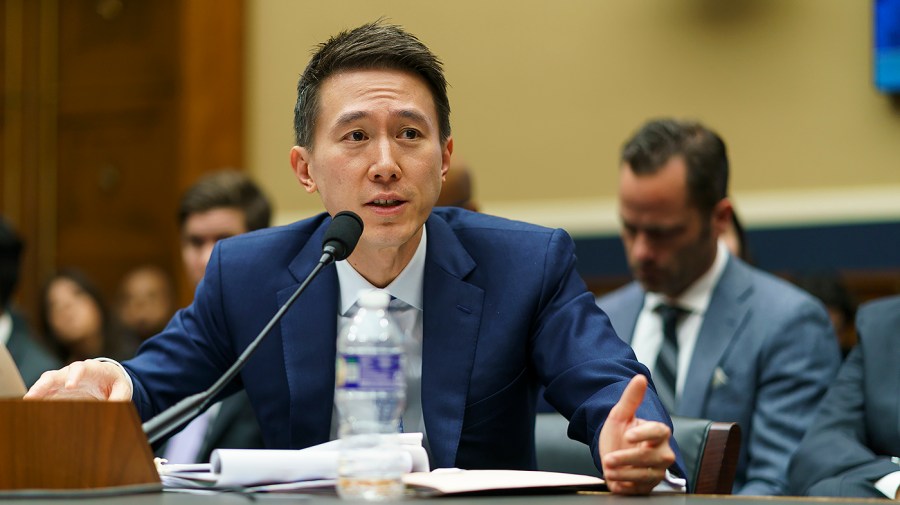How can the US force TikTok to sell?

As tech fan favorite TikTok continues to face harsh criticism from the U.S. government over security concerns due to its Chinese ownership, it’s also facing increasing pressure to completely divest from its Chinese-based parent company ByteDance.
Earlier this month, the Biden administration threatened to ban the app in the U.S. if ByteDance did not sell TikTok to an American company, a move experts see as legally feasible but that could come with its own challenges.
“The US government has regulatory and legal tools at its disposal that could force ByteDance to sell TikTok if deemed necessary for national security reasons,” said Joe Gagliese, CEO of Viral Nation, a social media talent management and brand marketing agency based in Canada.
The basics: How could a TikTok ban be enforced?
“That said, it remains a complicated and dynamic situation for which few, if any of us, have enough information to anticipate specific outcomes,” he added.

Does the U.S. have legal power to force ByteDance to sell TikTok?
Under the Exon-Florio amendment, a law established in 1988 to review foreign investment in the U.S., the president has the legal authority to block or unwind acquisitions conducted by foreign entities if the transaction poses a national security concern to the U.S., said Bryan Cunningham, an advisor at Theon Technology and a former White House lawyer.
“In this case, the president, advised by CFIUS, likely has the power to reverse and nullify ByteDance’s purchase of Musical.ly. [now known as TikTok],” he said.
Related info: How could the US ban TikTok?
President Donald Trump ordered such a divestment in 2020 but although the order was blocked by federal courts, “they did not find that the president lacked the power to order the unwinding, only that the process was insufficient,” Cunningham explained.
“Although it’s not certain, I believe our courts ultimately would uphold a more thorough and well-reasoned order to ByteDance, but the process likely would be tied up in the courts for years,” he added.
China already pushing back on any TikTok sale
Hannah Kelley, a research assistant in the technology and national security program at the Center for a New American Security, said that ByteDance is unlikely to divest and succumb to Biden’s request.
“Biden’s recent ultimatum shows that no proposed mitigation strategies under the CFIUS review process have proven sufficient in satisfying U.S. government concerns, including the long-awaited Project Texas,” Kelley said.
Project Texas is a plan devised by TikTok to address some of the security concerns raised by the U.S. government. Under the project, American data would be routed and stored with Oracle, a Texas-based software company.
TikTok’s CEO Shou Zi Chew, who testified before Congress last week, said that the issue isn’t about who owns the app but more about how the company can protect U.S. user data from unauthorized foreign access.
The Chinese government has also pushed back on Biden’s demands, saying that it would “resolutely oppose” the forced sale of the social media platform.
“If the news is true, China will resolutely oppose it,” said Chinese Ministry of Commerce spokesperson Shu Jueting in a statement last week.
Shu added that a potential forced sale of TikTok “would seriously damage investors from multiple countries including China” and hurt the country’s “confidence to invest in the United States.”
The government could use other means to restrict TikTok from operating in the US
If a forced sale proves difficult to carry out, experts said the government could find other ways to make it difficult for TikTok to operate within the U.S.
Kelley said the bipartisan RESTRICT Act could do just that. The legislation, introduced by Senate lawmakers earlier this month, would give the federal government more power to regulate or ban technology tied to foreign adversaries such as TikTok.
Under the bill, the Commerce Department would identify and mitigate risks posed by technology linked to foreign adversaries, including China, North Korea, Iran, Russia, Cuba and Venezuela.
More to the story: US faces questions over potential TikTok ban
Kelley said that the legislation “offers a clean legal authority to address problematic products and services like TikTok from a range of countries of concern.”
“It provides both the framework to address TikTok directly and a broader authority to look beyond this one issue and actor,” she added.
Gagliese said the U.S. could also put pressure on tech giants like Apple and Google to restrict or ban the application from their marketplace.
A forced TikTok sale could lead to some challenges
Cunningham reiterated that a forced sale of TikTok will probably be challenged once again by U.S. federal courts and would likely be tied up in litigation for months, if not years.
He also said that China could potentially retaliate against the U.S. economically and diplomatically.
Banning the app nationwide could also bring its own challenges.
Gagliese said that if the U.S. government follows through with a nationwide ban, it could “cause direct economic challenges for its own citizens and U.S.-based businesses.”
“Social media has enabled individuals and businesses of all sizes to reach their customers at scale, to build brand loyalty and launch products,” he added. “Small-to-medium product and service businesses can go a long way without a website these days by leveraging social media to promote and drive commerce directly on these platforms.”
Copyright 2023 Nexstar Media Inc. All rights reserved. This material may not be published, broadcast, rewritten, or redistributed. Regular the hill posts







